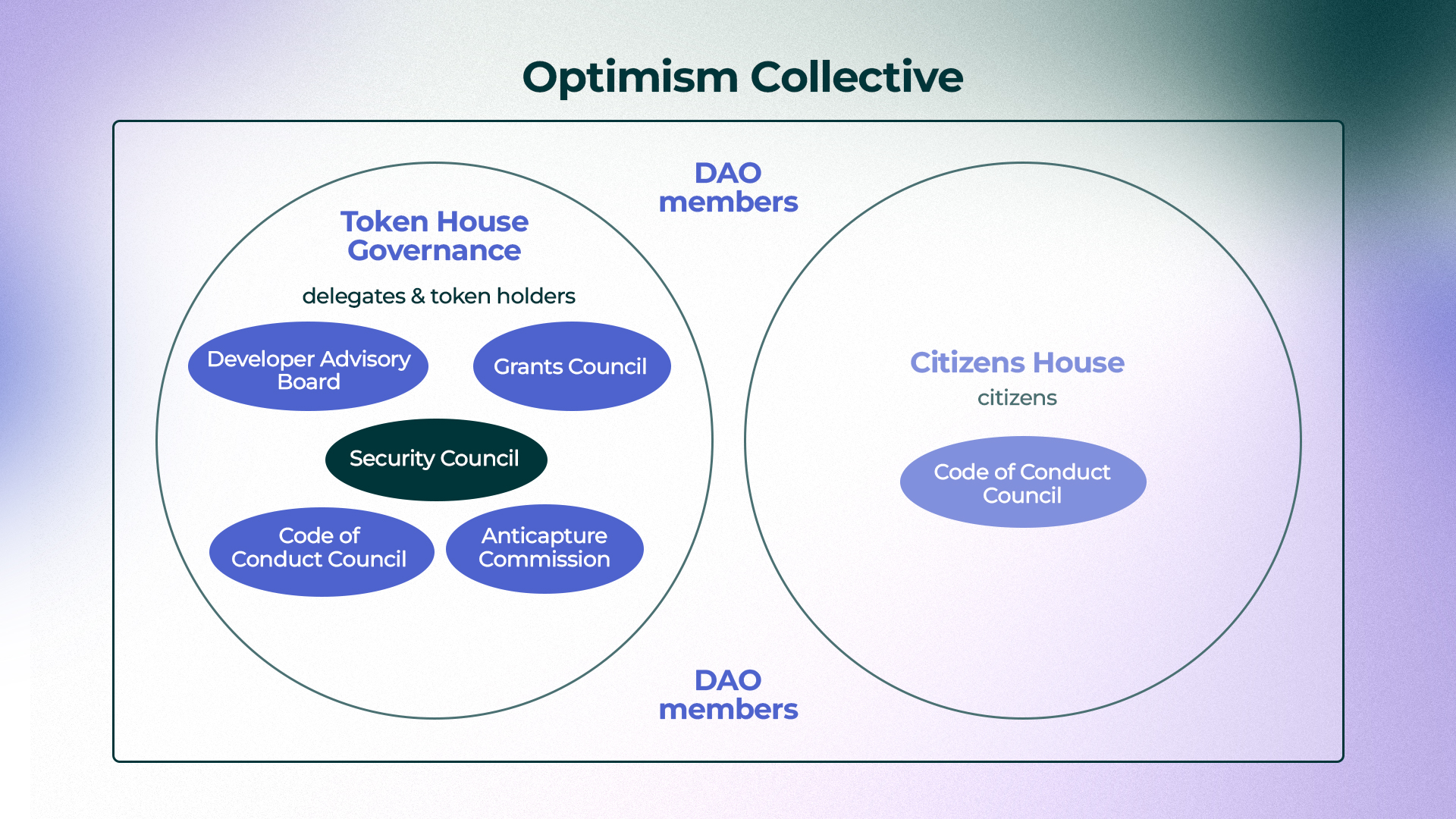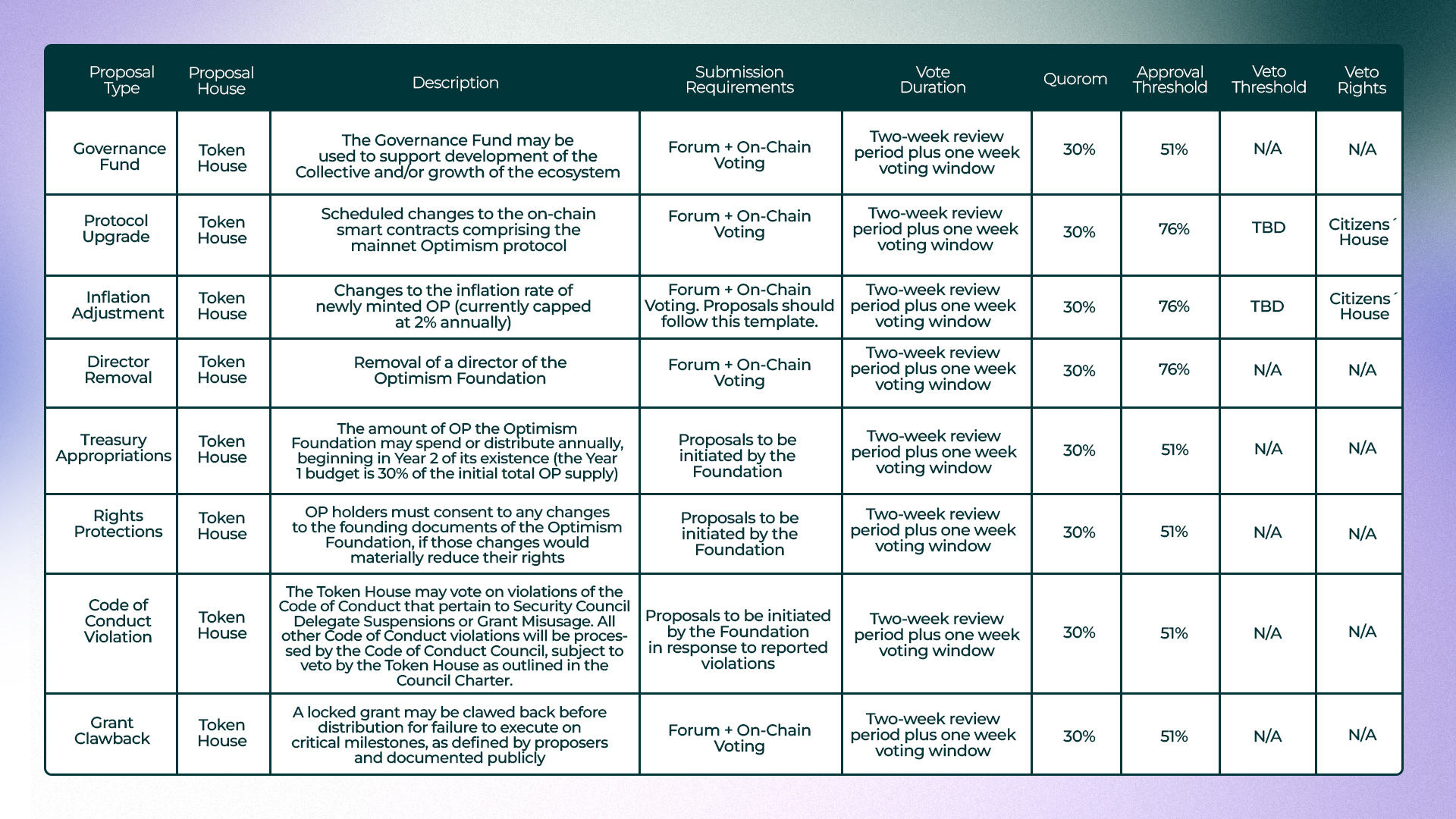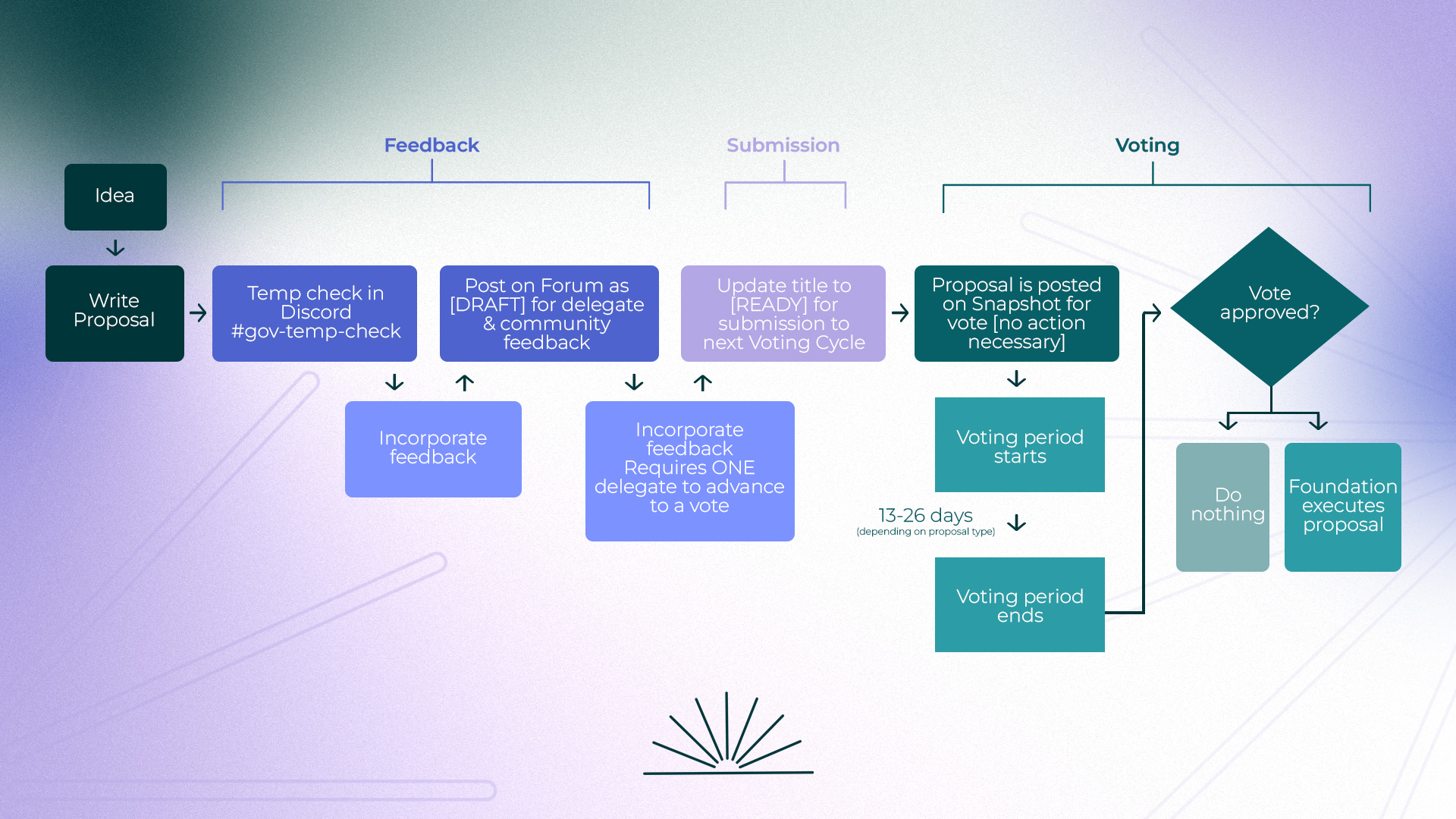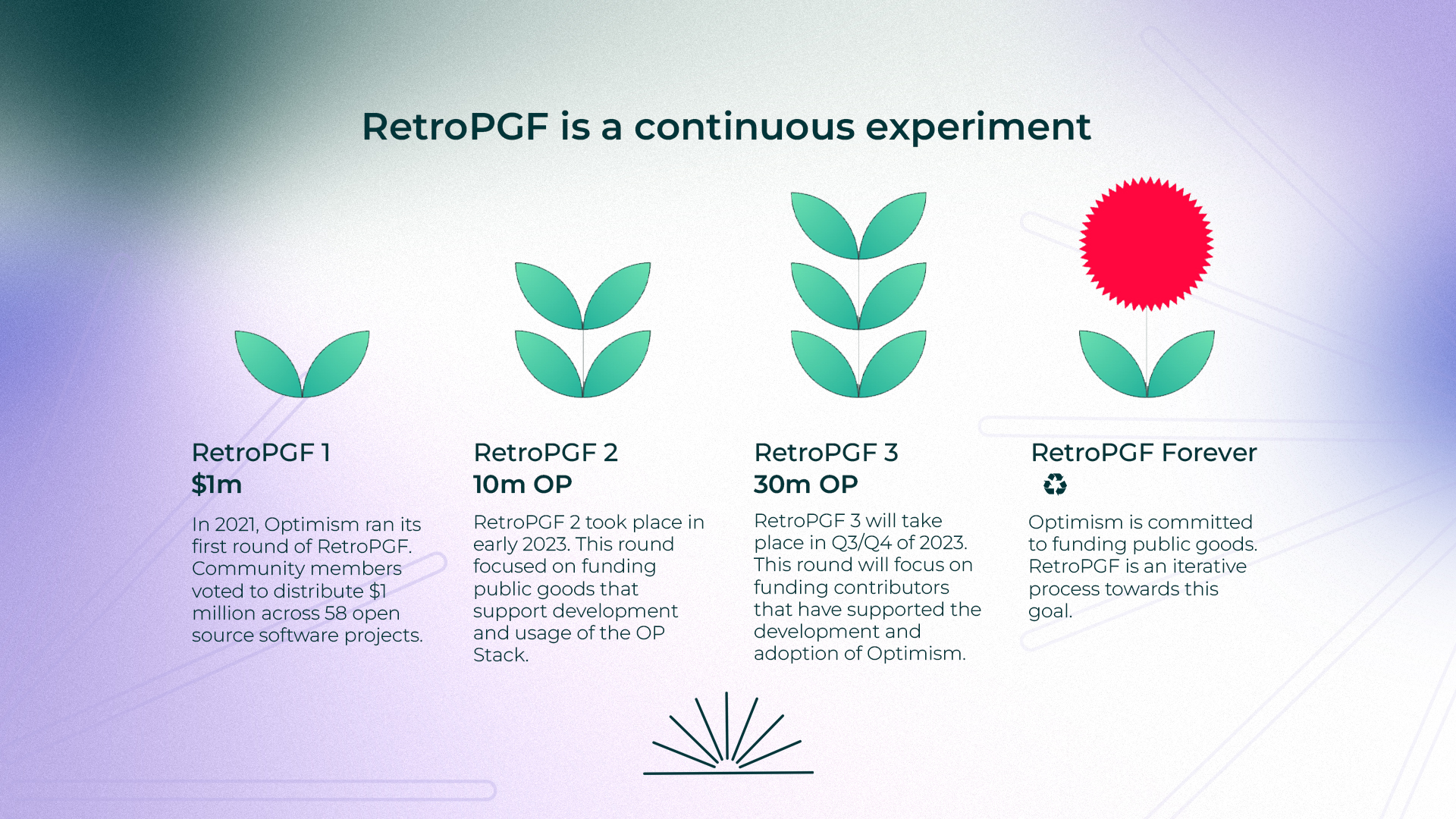Optimism
Optimism is a Layer 2 blockchain protocol that uses optimistic rollups to scale Ethereum and achieve fast, secure, and low-cost transactions. Optimism has an explicit "public goods" vision for its Layer 2 solutions. It aims for continuing development and progressive decentralization through governance experiments.
In early 2020, the Optimism team transitioned into a for-profit company to make Ethereum more scalable through optimistic rollups. Optimism hoped to find a way to fund the ongoing development of public goods in the Ethereum ecosystem and beyond.
In September 2020, Optimism released their EVM compatible testnet, followed several months later by their Alpha Mainnet. In October 2021, they released the EVM Mainnet, and in December of the same year, Optimism launched their Open Mainnet.
The Optimism Colective
In late April of 2022, Optimism announced the Optimism Collective, an experiment in governance consisting of two co-equal "houses" initiated by a series of token airdrops.
This change in governance entailed the dissolution of Optimism PBC and the creation of:
- TheOptimism Foundation is a not-for-profit in charge of nourishing the Collective and guiding it toward decentralization. It handles all legal aspects of the Collective and controls the amount of OP in circulation. The Board of Directors consists of Abbey Titcomb, Ben Jones, Brian Avello, Eva Beylin, and Jing.
- OP Labs, led by Liam Horne (CEO) and Floersch (CTO), will continue the development of the Optimism protocol.
The Optimism Collective's governance is being built through iteration and continuous experimentation of strategies to avoid plutocratic governance and increase community governance to prove that public goods can be profitable and drive the sustained growth of a decentralized ecosystem. The optimistic vision adheres to the principle that "positive impact to the collective should be rewarded with profit to the individual."
Strategies are tried and tested through time-bound governance experiments known as "Seasons."
Season 4 focused on laying the groundwork for more community involvement and ran until September 2023. It included experiments on:
- Collective intents are a set of goals designed to align the Collective and its shared goals, with a budget allocated to bring it to developing each intent.
- Token House Missions to achieve an intent, either submitted by a community member or defined by the Foundation.
- Alliances are teams or working groups working to achieve a mission.
- Collective Trust Tiers: a system to set funding limits taking into account reputation and based on positive impact.
- Attestations as a non-token-based reward for Grants Council Members and Co-grantors, as the basis of reputation in the Collective.
Season 4 ended on September 20th, and we are now in the reflection period before Season 5.
Optimism Collective Governance
We will first review Optimism Collective's governance framework, proposals, and governance mechanism. Then, this section will outline key points of Season 5 and give an overview of what to expect in Season 6.
Governance Framework
Optimism launched a bi-cameral model governance model along with its token. Two houses function side-by-side and balance each other: the Token House and the Citizen House.

The Token House
All token holders are members of The Token House. Its responsibilities include:
- protocol upgrades
- its revenue-sourced Governance Fund and treasury,
- guarding the rights of $OP token holders.
The Token House works via delegates. In Q3 2022, it introduced non-binding committees to decentralize decision-making by topics and alleviate some of the workload on its representatives and other community leaders.
Season 5 introduced 4 new structures within the Token House.
- The Security Council is a group of community members responsible for executing protocol upgrades by governance.
- The Developer Advisory Board to aid governance with technical decisions.
- Season 5 will bring the creation of a Code of Conduct Council to handle conduct violations within the Token House and the Citizen’s House.
- The Anticapture Commission to prevent capture of the Token House by any one stakeholder group.
Grants Counsil
The Grants Council was initiated to facilitate the Grant allocation process. The Council currently runs completely public through the Charmverse dashboard. You can find the dashboard and further information on the Council here.
The Citizen House
The Citizen House comprises Citizens who either were initially appointed by the Optimism Foundation or later elected by The Token House.
Citizens are "meant to represent individual human stakeholders of the Collective."
Their responsibilities include Optimism's Retroactive Public Goods Funding, which allocates grants to projects nominated and judged retroactively by Citizens for their ecosystem impact. Learn more about the third round that is currently underway here.
Before, citizen badges used to be assigned based on the community members' reputation. Citizen selection criteria is currently based on community members' attestation reputation. But it is expected to be changed in the future. As such, voting in RetroPGF 3 "does not guarantee permanent participation in the Citizens' House and future iterations of RetroPGF."
Read more about Optimism's identity layer, AttestationStation here.

Governance Proposals
Token House Governance Proposals
The Token Voting House accepts different proposal types following its various responsibilities:
- Governance Funds
- Protocol Upgrades
- Inflation Adjustments
- Director Removal
- Treasury Appropriations
- Rights Protections
- Code of Conduct Violations
- Grant Clawbacks
A Token House governance proposal is approved if it satisfies:
- Quorum, measured as a % of votes cast for a proposal of the existing votable OP supply.
- Approval threshold is calculated as a % of votes cast to support the total number of votes for a specific proposal.
Depending on the Proposal Type, exact quorum and approval threshold requirements may vary. For more information, refer to the proposal types below.

Governance Process and Mechanisms
Voting Power
Optimism has one of the most active governance systems in the ecosystem, with 57% active delegates and a participation rate in proposals oscillating around 60% (percentage of votes cast in relation to total voter supply).
According to Curia’s insights on voting power distribution, the top 25 delegates hold about 69% of total voting power.

Voting Process
The Token House Governance & Voting Process
The primary tools for Token House governance are:
- Token House Governance Contract: The on-chain voting contract is used to vote on all Token House-qualifying governance proposals.
- Optimism Governance Portal: This front-end interface enables Token House members to delegate, and vote their on-chain.
- To discuss, give feedback and vote: The Optimism Forum, Discord, and Agora.
The full voting process of Season 4, from idea to implementation, is detailed in the Operating Manual.

The Citizen House Governance & Voting Process
RetroPGF rounds:
- Scoping: This stage defines the amount of rewards to be allocated and the scope of impact.
- Profile creation: Projects are notified and invited to create a profile in the RetroPGF Application Manager.
- Voting: Votes are collected and tallied from Citizens with the requisite Attestation Station entries.
- Disbursement: The rewarded amount is distributed among winning projects based on the weighted average of Citizens' House votes.
- Compliance: The Foundation will collect information from projects.
Distribution GovFund Grants is already in Gov Season 3 and round 4, and you can find details about it here.

Season 5
Optimism Governance continues to evolve towards a robust and sustainable system. Here is what you can expect on Season 5.
Intents
Season 5 will focus on four Intents:
- Making progress toward technical decentralization
- Growing the super chain
- Improving the consumer experience
- Improving governance accessibility
Below, you will find a non-exhaustive list of initiatives to further these intents.
Progress towards decentralization
To achieve this goal, two structures will be built:
- The Security Council marks a significant milestone in protocol decentralization as it replaces the Optimism Foundation's multisig wallet.
- The creation of an advisory board prioritizes making informed decisions and voting based on helpful information.
These structures evidence the growth of Optimism and a move further away from centralized decision-making.
To further this Intent, the Collective voted on a Law of Chains, an open neutrality framework, and a core governing document of the Superchain. For more information on sequencer governance and its relationship to chain, user, and platform governance, please refer to these resources: here and here.
Growing the Superchain
Season 5 will introduce the Chain Delegation Program, allowing OP Chains to receive temporary delegation from the Governance Fund. Learn more about this initiative here.
Improve the consumer experience
The Token House delegates chose this intent to increase user adoption of the Optimism network by simplifying engagement with practical use cases. Read more about this intent here.
Improve governance accessibility
Initiatives include the creation of an Anticapture Commission, developing a Code of Conduct, updating Trust Tiers, and granting attestation to high-impact contributors. Learn more here.
Joint-House voting
The Collective will fully bring the Citizens' House online and execute its first joint-house votes. After performing three rounds of RetroPGF, this milestone will mark the next stage of maturity for the Citizens' House as they participate in Optimism's Governance beyond grant allocations.
Please keep in mind these initiatives might change. Stay updated on the Optimism's Governance forum.
Season 6
Season 6 Intents and initiatives will be developed and ratified in 2024. This is what we know so far:
- Protocol Revenue Allocation
- On-chain treasury execution
Season 6 will introduce a voting process to allocate Protocol Revenue. It will include the introduction of a Treasury Council responsible for making high-level proposals to governance about allocating resources. Proposals for revenue allocation protocol will be submitted for approval by the Token House and for veto by the Citizens' House.
During Season 6, parts of the Optimism Treasury will move on-chain. Governance will be able to initiate transactions that carry tokens from the OP Token Treasury entirely on-chain. This on-chain execution will begin with an emergency safeguard that will be removed in future seasons.
Contribution Pathways
Optimism has various ways to contribute to the Collective.
Delegation
The Collective encourages the active involvement of delegates in the Token House governance. It requires understanding the Collective's vision and being up to date on documents, proposals, and discussions. You can learn more about how to become a delegate here.
In a past season, the Foundation provided token-based incentives to active delegates and Grant Council members for their contributions. It did so through a one-time compensation with retroactive rewards. This reward was also given to Grant Council members to acknowledge that their contributions exceeded expectations.
During Season 4, delegates received Retro Delegate Rewards between 3K and 10K OP tokens each according to different participating criteria. Meanwhile, Grant Council reviewers will receive between 25 and 30K during Season 5.
Ambassadors program and accessibility
To spread the Optimistic vision, get involved with the Ambassadors program. Ambassadors create content, actively engage with the community, answer questions, and help onboard people into the Collective.
Optimism also invites people to get involved with making all content more accessible by translating content through CrowdIn and improving documentation.
Developers
Develop OP goals! If you want to develop Optimism's Ecosystem, you can check out Ideas to develop and contribute to building different projects. Learn about other ways developers can participate here.
Grants
Optimism funds projects to be developed with various grants.
- Proposed Mission
- Grant Council
Under each Intent, contributors can apply for Proposed Missions, which are specific projects or areas of focus that the Governance Fund is willing to support by allocating funds from that Intent Budget to develop that particular Intent. For example, you can propose a Mission under Intent #2 (Growing the Superchain) to get funds and develop projects deploying on OP Mainnet. Read more about each Intent in the Guide to Season 5.
Grants Council role in Season 5 is still being developed. The Grant Council is currently under election until November 15. In the meantime, you can read the Request for Grant Process and Projects elected for Season 4 here.
If you plan on submitting for a grant, stay up to date about grants with the Optimism Grants Changelog and in the Optimism Discord.
NumbaNERDs
Boost transparency in the Ecosystem by helping the analytics team. NumbaNERDs "ensure that there is always high-quality analytics and transparency around grant spending for delegates." Learn how to join the program here.
Learn more about how to contribute in Optimism Docs.